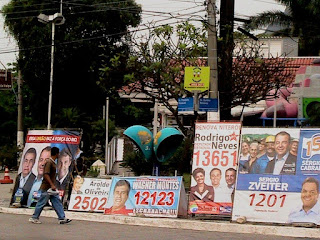
To begin to unravel things, there are three levels by geographical reach:
1) National- President
2) Federal- The state, represented at national level in Brasilia (with 18 other states), with voting for Senator, Governor and Federal Deputy.
3) State- Politics based in Rio for the state's municipalities, with voting for State Deputies for the Assembly.
You can see why when there are 19 states, each defending its own position, its hard to implement national strategies. Its similar to what's happened in the decentralization of Spain's autonomous regions.
Here's a summary of the outcome:
President of the Republic
Overall, nine candidates were running.
The top three were Dilma Rousseff, José Serra and Marina Silva.
In the first round, Dilma won 47% of the votes, whilst Serra got 33%.
A majority is needed to become President.
Second-round presidential elections between the two front-runners are due on 31st October.
Senator for the State of Rio de Janeiro, at national level
The young and dynamic-looking Lindberg Faria, who was born in the north-eastern state of Paraiba, and started getting involved in politics at the age of 14, won Rio's seat as State Senator. In 1992, he was head of the national union of students and in 1994 won a seat as Rio's Federal Deputy, whilst in the Communist party. He has been an ally of Lula's since before Lula became President, and is now in the PT party. Lindberg is a figure to watch out for in the coming years.

Governor of the State of Rio de Janeiro
Sergio Cabral, the popular current governor of the state of Rio, unsurprisingly stays in power, easily beating Gabeira of the Green Party, who nonetheless seems highly-respected, honest and committed.
Federal Deputies for the State of Rio de Janeiro, at national level
46 candidates were voted in as Rio State Deputies (Deputados Federais). Two of whom got in include:
- Garotinho, accused of massive corruption and theft of public funds, with 8% of the vote. Its incredible he was allowed to run, whilst the accusations are so public and there's talk of legal action. Even more incredible people voted for him, and in such numbers.
- Romario, the ex-footbal player, with less than 2% of the vote. Romario was quoted as saying I'm still learning what the job will be. I'm not a ready politician yet...but people can be sure that I will score a lot of goals in Brasilia.

Perhaps its good to know that its not only in Rio state that unsuitable-sounding candidates have been elected.
In Sao Paulo state, which is Rio's great rival, a comedian by the name of Tiririca, who has been accused as being ideologically false (does this mean he's clueless, has no morals or is constantly changing his mind?) and illiterate (probably unlikely), actually got the highest number of votes of any Federal Deputy in Brazil- over 1.3 million.
Deputy for the State of Rio de Janeiro, at state level
Now this is incredible for sheer numbers:
1643 candidates running to be a State Deputy (Deputado Estadual) within the State Assembly.
That's why there were so many election posters everywhere!
70 places were given.
The most votes were won by a presenter called Wagner Montes.
Other celebrities who got in were Bebeto, another ex-football player, and Myrian Rios, an actress.
It doesn't seem to matter that non-politicians are in the State Assembly. Currently it counts with Roberto Dinamite (Robert Dynamite)- an ex-football player, radio hosts, an evangelical preacher and successful businessmen.
Some of those also running for State Deputy included:
Zé Bonitinho (Joe Pretty Little One)
Zé Radio (Joe Radio)
Zé Mineiro (Joe The Miner)


